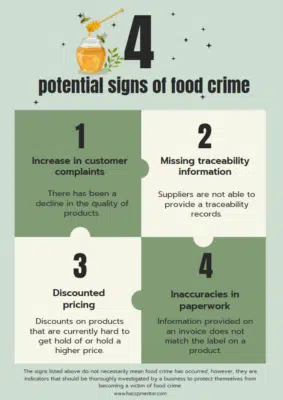What is food crime?
Food crime means serious cheating and related illegal activities in food supply chains. It is often called food fraud (which I have previously written about here). This can harm consumers, food businesses, and the overall food industry. Food crime can happen in many ways, from single acts of dishonesty by one person, to planned illegal activities by criminal groups.
Examples of food crime
Food crimes include theft of livestock or goods, unlawful processing like unlicensed slaughter, waste diversion where disposed food enters the supply chain, adulteration such as adding water to fruit juice, substitution like replacing lamb with goat, misrepresentation of food origin or quality, and document fraud involving false traceability or certification claims.
Potential signs of food crime
Detecting food crime poses a significant challenge due to the complex and global nature of food supply chains. The various forms it takes, from isolated acts of dishonesty to organised illegal activity, further complicate its detection. Here are a few activities to look out for in your business.
- Customer complaints about reduced product quality and taste changes have increased.
- The products or ingredients you bought from suppliers aren’t as described.
- Suppliers can’t track where their products come from.
- Your tests show a problem with the authenticity, origin, or quality of the products you received.
- Mistakes in the paperwork you got for items you bought. For instance, the information on a bill doesn’t match the label on an item. This could mean someone is faking documents.
Staff training tool
Here is a training tool graphic I developed to help educate your staff. Display it in your staff newsletters, on notice boards or on the back of staff toilet doors.

Download FREE Training Printable
If you want a high quality printable PDF of this graphic, let me know by providing your details below. I will then send it to you via email.
Preventing food crime
There are several things you business can do to prevent food crime. Knowledge of your supply chains is imperative and undertaking a vulnerability assessment is a must. I am a big believer in ‘knowledge is power’ therefore I highly recommend completing regular horizon scanning and updating your knowledge of recent and historical food fraud cases. Our accredited VACCP/TACCP Awareness training can get you started on your learning path.
Food crime guidance tool
The National Food Crime Unit (NFCU) in the UK have published an excellent guidance tool to help businesses manange this issue. It is important that all those working in a food business are made aware of these potential signs, and how to report any concerns.


